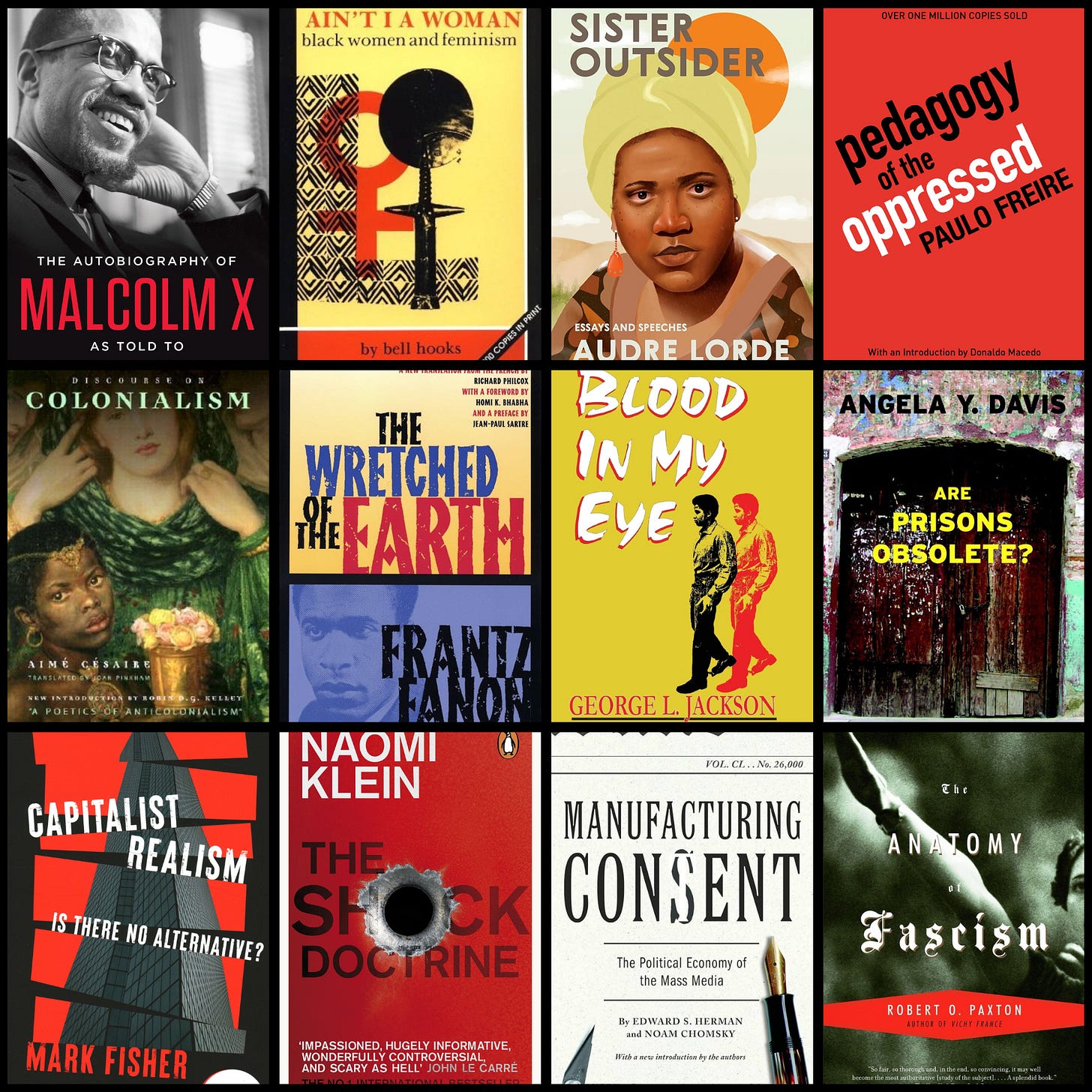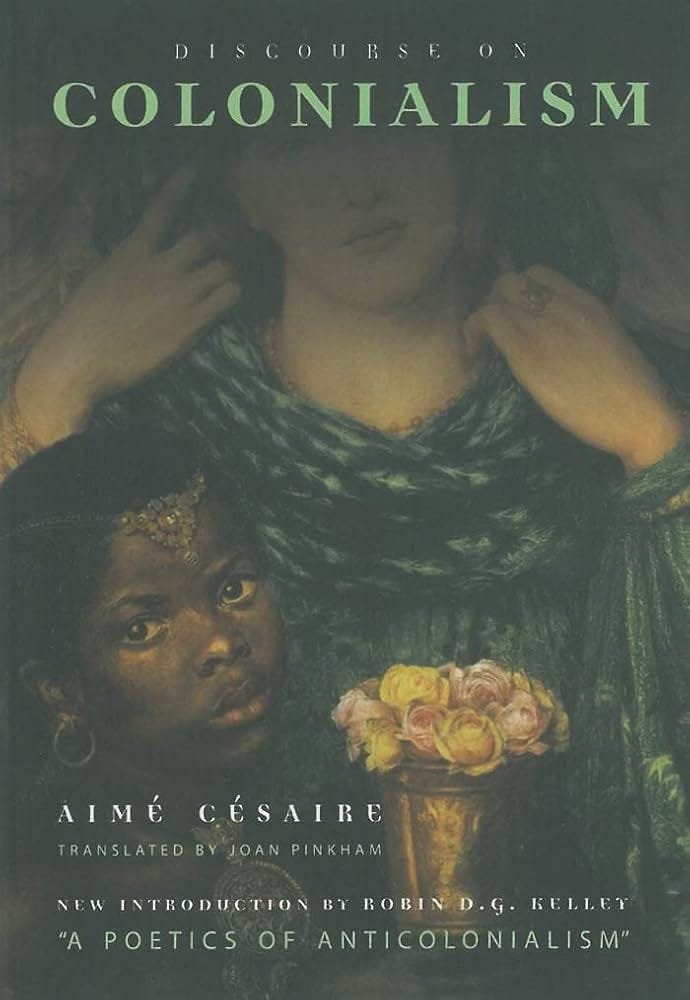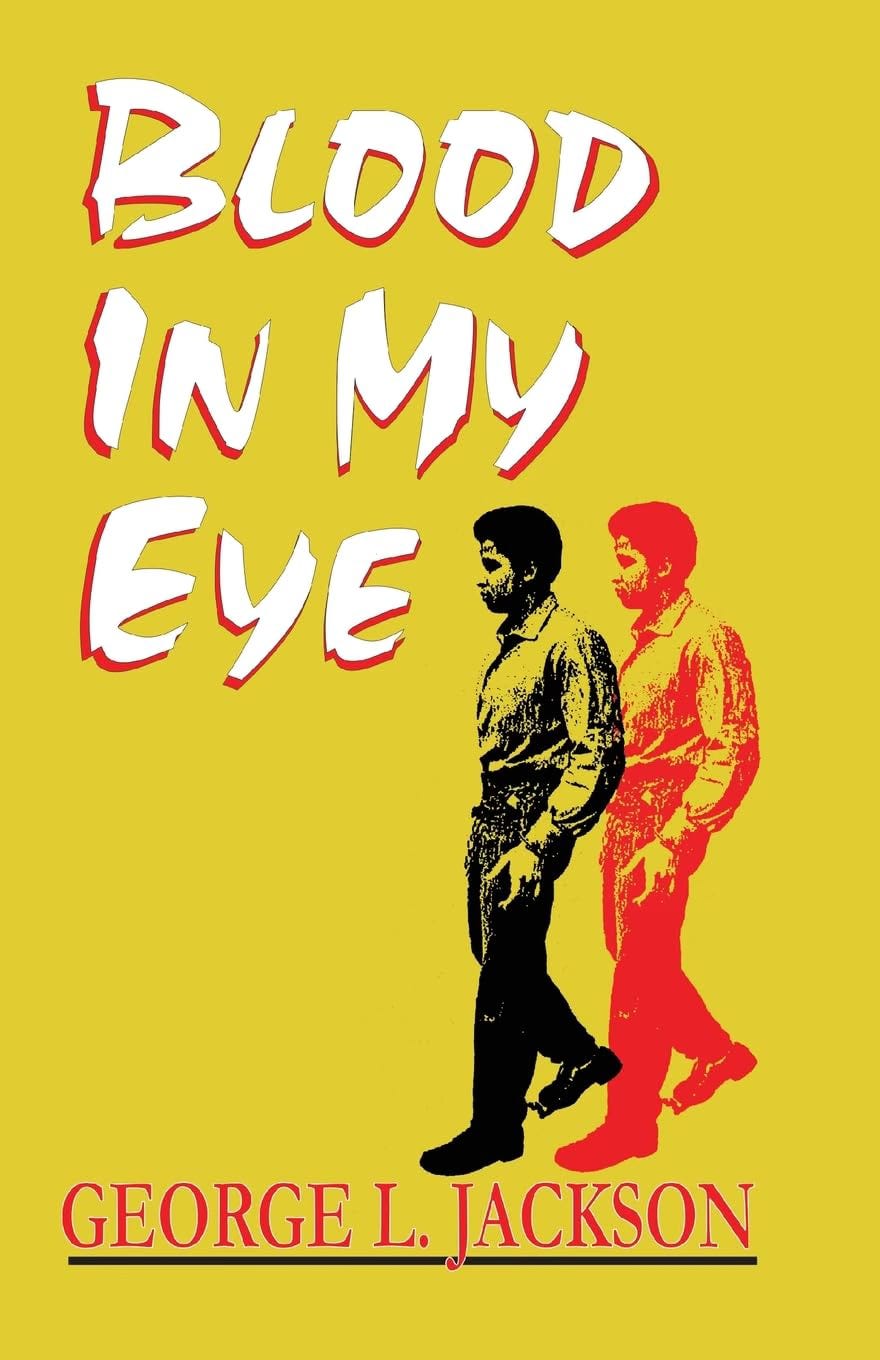12 Essential Books to Catch Up on Liberation Theory
Plus 2 Bonus Reads for Educators and Culture Workers
Whether you're new to liberation movements or returning to this work with renewed urgency, these 12 books offer a powerful foundation to help you catch up on the roots, contradictions, and evolving visions of liberation.
The Autobiography of Malcolm X – Malcolm X & Alex Haley (1965)
Ain't I a Woman? Black Women and Feminism – bell hooks (1981)
Sister Outsider – Audre Lorde (1984)
Pedagogy of the Oppressed – Paulo Freire (1970)
Discourse on Colonialism – Aimé Césaire (1950)
The Wretched of the Earth – Frantz Fanon (1961)
Blood in My Eye – George Jackson (1971)
Are Prisons Obsolete? – Angela Y. Davis (2003)
Capitalist Realism: Is There No Alternative? – Mark Fisher (2009)
The Shock Doctrine: The Rise of Disaster Capitalism – Naomi Klein (2007)
Manufacturing Consent: The Political Economy of the Mass Media – Edward S. Herman & Noam Chomsky (1988)
The Anatomy of Fascism – Robert O. Paxton (2004)
Bonus Reading for Educators and Culture Workers
For White Folks Who Teach in the Hood... and the Rest of Y'all Too – Christopher Emdin (2016)
Ratchetdemic: Reimagining Academic Success – Christopher Emdin (2021)
The Autobiography of Malcolm X – Malcolm X & Alex Haley (1965)
"The Autobiography of Malcolm X" was published posthumously in 1965 and is a powerful narrative of transformation, chronicling Malcolm X's journey from street hustler to global human rights leader. Blending spiritual awakening with political radicalization, the book remains a foundational text in Black liberation, pan-Africanism, and American autobiography.
Ain't I a Woman? Black Women and Feminism – bell hooks (1981)
"Ain't I a Woman?" is a foundational critique of how racism and sexism have uniquely oppressed Black women throughout U.S. history. Drawing from slavery to the 1970s, hooks exposes how both the feminist and Black liberation movements marginalized Black women while challenging enduring stereotypes and advocating for an intersectional approach to liberation.
Sister Outsider – Audre Lorde (1984)
"Sister Outsider" is a collection of essays and speeches by Audre Lorde, exploring the intersections of race, gender, sexuality, and class through the lens of her lived experience as a Black lesbian feminist poet. Lorde challenges systemic oppression and calls for a feminism rooted in coalition, creativity, and the radical embrace of complexity.
Pedagogy of the Oppressed – Paulo Freire (1970)
"Pedagogy of the Oppressed" is a foundational text in critical pedagogy, arguing that education should be a collaborative process in which learners are co-creators of knowledge rather than passive recipients. Drawing on Marxist and decolonial thought, Freire critiques the "banking model" of education and proposes a liberatory, dialogical approach aimed at humanization and the dismantling of oppressive systems.
Discourse on Colonialism – Aimé Césaire (1950)
"Discourse on Colonialism" is a foundational postcolonial text that exposes colonialism as a violent, racist, and dehumanizing project rooted in economic exploitation and moral hypocrisy. Using poetic Marxist critique, Césaire argues that colonial powers corrupted civilization itself and laid the ideological groundwork for fascism, revealing European colonizer's so-called "civilizing mission" as a brutal, self-serving lie.
The Wretched of the Earth – Frantz Fanon (1961)
"The Wretched of the Earth" is a radical analysis of the psychological and political violence inherent in colonization, arguing that decolonization is an inherently violent process necessary for reclaiming humanity and nationhood. Drawing from Marxism and anti-colonial struggle, Fanon emphasizes the revolutionary potential of the lumpenproletariat, critiques assimilationist intellectuals, and asserts that true national culture emerges through collective resistance and ongoing liberation.
Blood in My Eye – George Jackson (1971)
"Blood in My Eye" is a collection of radical essays and letters written shortly before his assassination in prison, outlining his Marxist-Leninist-Maoist-Fanonist vision of armed struggle, Black liberation, and anti-capitalist revolution in the United States. Drawing on guerrilla warfare strategy and revolutionary theory, Jackson critiques American fascism, the failures of reform, and the necessity of militant resistance led by a conscious vanguard.
Are Prisons Obsolete? – Angela Y. Davis (2003)
"Are Prisons Obsolete?" is a foundational text in the prison abolition movement that argues the prison system is a racist, gendered, and profit-driven institution that fails to deliver justice or rehabilitation. Davis traces the historical roots of incarceration, critiques the rise of the prison-industrial complex, and calls for transformative alternatives grounded in healing, equity, and systemic change.
Capitalist Realism: Is There No Alternative? – Mark Fisher (2009)
"Capitalist Realism: Is There No Alternative?" examines the pervasive notion that capitalism is the only viable system, rendering it nearly impossible to envision meaningful alternatives. Fisher examines how this ideology shapes culture, education, work, the environment, and mental health, arguing that capitalist realism suppresses political imagination and reinforces neoliberal control even through seemingly anti-capitalist forms.
The Shock Doctrine: The Rise of Disaster Capitalism - Naomi Klein (2007)
"The Shock Doctrine" argues that neoliberal policies—like privatization, deregulation, and austerity—are often imposed during times of crisis, when populations are too disoriented to resist, a strategy she calls "disaster capitalism." Drawing on global case studies from Chile to Iraq, Klein reveals how economic elites exploit wars, natural disasters, and upheaval to push through unpopular free-market reforms that enrich corporations while deepening inequality and social harm.
Manufacturing Consent: The Political Economy of the Mass Media – Edward S. Herman & Noam Chomsky (1988)
"Manufacturing Consent" argues that U.S. mass media functions as a powerful system of propaganda, subtly shaping public opinion to support elite interests through market forces, self-censorship, and structural bias—rather than overt state control. Central to their analysis is the "propaganda model," which outlines five filters that distort news reporting: ownership, advertising sourcing, flak, and ideological threats, such as anti-communism or terror.
The Anatomy of Fascism – Robert O. Paxton (2004)
"The Anatomy of Fascism" offers a rigorous definition of fascism, arguing it emerges when conservative elites in dysfunctional societies form coalitions with radical nationalist movements to suppress leftist threats and maintain power. Through detailed analysis of Fascist Italy and Nazi Germany, Paxton distinguishes between different forms of fascist rule and rejects the idea that all authoritarian movements fit the fascist mold.
Bonus Reading for Educators and Culture Workers
For White Folks Who Teach in the Hood... and the Rest of Y'all Too - Christopher Emdin (2016)
In this transformative work on education justice, Emdin challenges traditional approaches to urban education by introducing "reality pedagogy"—a model that centers students' cultural identities, particularly through hip-hop, science, and community-rooted knowledge. Drawing from his experience as both educator and researcher, Emdin critiques deficit-based models of teaching and offers strategies for creating classrooms that honor students' lived experiences, fostering engagement, empowerment, and critical thinking.
Ratchetdemic: Reimagining Academic Success – Christopher Emdin (2021)
Emdin redefines what it means to be educated by confronting the racism, classism, and cultural bias embedded in dominant academic norms, advocating for learning spaces where "ratchet" and "academic" identities can coexist. With radical love as its core principle, the book celebrates the intellectual brilliance found in marginalized youth and argues for a pedagogical shift that validates cultural expression, emotional truth, and collective liberation.

















